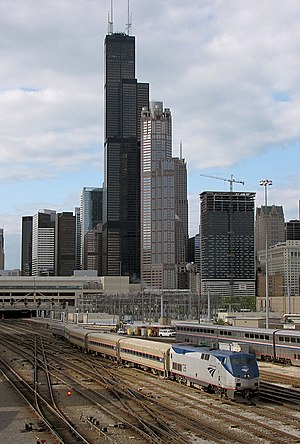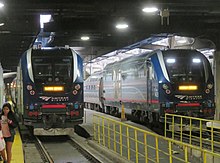Lincoln Service
 A Lincoln Service departs Chicago in May 2009. Directly behind is the Sears Tower (now Willis). | ||||||||||||||||||||||||||||||||||||||||||||||||||||||||||||||||||||||||||||||||||||||||||||||||||||||||||||||||||||||||||||||||||||||||||||||||||||||||||||||||||||||||||||||||||||||||||||||||||||||||||||||||||||||||||||||||||||||||||||||||||||||||||||||||||||||||||||||||||||
| Overview | ||||||||||||||||||||||||||||||||||||||||||||||||||||||||||||||||||||||||||||||||||||||||||||||||||||||||||||||||||||||||||||||||||||||||||||||||||||||||||||||||||||||||||||||||||||||||||||||||||||||||||||||||||||||||||||||||||||||||||||||||||||||||||||||||||||||||||||||||||||
|---|---|---|---|---|---|---|---|---|---|---|---|---|---|---|---|---|---|---|---|---|---|---|---|---|---|---|---|---|---|---|---|---|---|---|---|---|---|---|---|---|---|---|---|---|---|---|---|---|---|---|---|---|---|---|---|---|---|---|---|---|---|---|---|---|---|---|---|---|---|---|---|---|---|---|---|---|---|---|---|---|---|---|---|---|---|---|---|---|---|---|---|---|---|---|---|---|---|---|---|---|---|---|---|---|---|---|---|---|---|---|---|---|---|---|---|---|---|---|---|---|---|---|---|---|---|---|---|---|---|---|---|---|---|---|---|---|---|---|---|---|---|---|---|---|---|---|---|---|---|---|---|---|---|---|---|---|---|---|---|---|---|---|---|---|---|---|---|---|---|---|---|---|---|---|---|---|---|---|---|---|---|---|---|---|---|---|---|---|---|---|---|---|---|---|---|---|---|---|---|---|---|---|---|---|---|---|---|---|---|---|---|---|---|---|---|---|---|---|---|---|---|---|---|---|---|---|---|---|---|---|---|---|---|---|---|---|---|---|---|---|---|---|---|---|---|---|---|---|---|---|---|---|---|---|---|---|---|---|---|---|---|---|---|---|---|---|---|---|---|---|---|---|---|---|---|---|
| Service type | Higher-speed rail | |||||||||||||||||||||||||||||||||||||||||||||||||||||||||||||||||||||||||||||||||||||||||||||||||||||||||||||||||||||||||||||||||||||||||||||||||||||||||||||||||||||||||||||||||||||||||||||||||||||||||||||||||||||||||||||||||||||||||||||||||||||||||||||||||||||||||||||||||||
| Locale | Midwest United States | |||||||||||||||||||||||||||||||||||||||||||||||||||||||||||||||||||||||||||||||||||||||||||||||||||||||||||||||||||||||||||||||||||||||||||||||||||||||||||||||||||||||||||||||||||||||||||||||||||||||||||||||||||||||||||||||||||||||||||||||||||||||||||||||||||||||||||||||||||
| Predecessor | State House | |||||||||||||||||||||||||||||||||||||||||||||||||||||||||||||||||||||||||||||||||||||||||||||||||||||||||||||||||||||||||||||||||||||||||||||||||||||||||||||||||||||||||||||||||||||||||||||||||||||||||||||||||||||||||||||||||||||||||||||||||||||||||||||||||||||||||||||||||||
| First service | 2006 | |||||||||||||||||||||||||||||||||||||||||||||||||||||||||||||||||||||||||||||||||||||||||||||||||||||||||||||||||||||||||||||||||||||||||||||||||||||||||||||||||||||||||||||||||||||||||||||||||||||||||||||||||||||||||||||||||||||||||||||||||||||||||||||||||||||||||||||||||||
| Current operator(s) | Amtrak | |||||||||||||||||||||||||||||||||||||||||||||||||||||||||||||||||||||||||||||||||||||||||||||||||||||||||||||||||||||||||||||||||||||||||||||||||||||||||||||||||||||||||||||||||||||||||||||||||||||||||||||||||||||||||||||||||||||||||||||||||||||||||||||||||||||||||||||||||||
| Ridership | 548,955 (FY16)[1] | |||||||||||||||||||||||||||||||||||||||||||||||||||||||||||||||||||||||||||||||||||||||||||||||||||||||||||||||||||||||||||||||||||||||||||||||||||||||||||||||||||||||||||||||||||||||||||||||||||||||||||||||||||||||||||||||||||||||||||||||||||||||||||||||||||||||||||||||||||
| Route | ||||||||||||||||||||||||||||||||||||||||||||||||||||||||||||||||||||||||||||||||||||||||||||||||||||||||||||||||||||||||||||||||||||||||||||||||||||||||||||||||||||||||||||||||||||||||||||||||||||||||||||||||||||||||||||||||||||||||||||||||||||||||||||||||||||||||||||||||||||
| Termini | Chicago, Illinois St. Louis, Missouri | |||||||||||||||||||||||||||||||||||||||||||||||||||||||||||||||||||||||||||||||||||||||||||||||||||||||||||||||||||||||||||||||||||||||||||||||||||||||||||||||||||||||||||||||||||||||||||||||||||||||||||||||||||||||||||||||||||||||||||||||||||||||||||||||||||||||||||||||||||
| Stops | 9 | |||||||||||||||||||||||||||||||||||||||||||||||||||||||||||||||||||||||||||||||||||||||||||||||||||||||||||||||||||||||||||||||||||||||||||||||||||||||||||||||||||||||||||||||||||||||||||||||||||||||||||||||||||||||||||||||||||||||||||||||||||||||||||||||||||||||||||||||||||
| Distance travelled | 284 miles (457 km) | |||||||||||||||||||||||||||||||||||||||||||||||||||||||||||||||||||||||||||||||||||||||||||||||||||||||||||||||||||||||||||||||||||||||||||||||||||||||||||||||||||||||||||||||||||||||||||||||||||||||||||||||||||||||||||||||||||||||||||||||||||||||||||||||||||||||||||||||||||
| Average journey time | 5 hours, 30 minutes[2] | |||||||||||||||||||||||||||||||||||||||||||||||||||||||||||||||||||||||||||||||||||||||||||||||||||||||||||||||||||||||||||||||||||||||||||||||||||||||||||||||||||||||||||||||||||||||||||||||||||||||||||||||||||||||||||||||||||||||||||||||||||||||||||||||||||||||||||||||||||
| Service frequency | Four round-trips daily | |||||||||||||||||||||||||||||||||||||||||||||||||||||||||||||||||||||||||||||||||||||||||||||||||||||||||||||||||||||||||||||||||||||||||||||||||||||||||||||||||||||||||||||||||||||||||||||||||||||||||||||||||||||||||||||||||||||||||||||||||||||||||||||||||||||||||||||||||||
| Train number(s) | 300-307 | |||||||||||||||||||||||||||||||||||||||||||||||||||||||||||||||||||||||||||||||||||||||||||||||||||||||||||||||||||||||||||||||||||||||||||||||||||||||||||||||||||||||||||||||||||||||||||||||||||||||||||||||||||||||||||||||||||||||||||||||||||||||||||||||||||||||||||||||||||
| On-board services | ||||||||||||||||||||||||||||||||||||||||||||||||||||||||||||||||||||||||||||||||||||||||||||||||||||||||||||||||||||||||||||||||||||||||||||||||||||||||||||||||||||||||||||||||||||||||||||||||||||||||||||||||||||||||||||||||||||||||||||||||||||||||||||||||||||||||||||||||||||
| Class(es) | Business class and reserved coach | |||||||||||||||||||||||||||||||||||||||||||||||||||||||||||||||||||||||||||||||||||||||||||||||||||||||||||||||||||||||||||||||||||||||||||||||||||||||||||||||||||||||||||||||||||||||||||||||||||||||||||||||||||||||||||||||||||||||||||||||||||||||||||||||||||||||||||||||||||
| Seating arrangements | Airline-style coach seating | |||||||||||||||||||||||||||||||||||||||||||||||||||||||||||||||||||||||||||||||||||||||||||||||||||||||||||||||||||||||||||||||||||||||||||||||||||||||||||||||||||||||||||||||||||||||||||||||||||||||||||||||||||||||||||||||||||||||||||||||||||||||||||||||||||||||||||||||||||
| Catering facilities | On-board café | |||||||||||||||||||||||||||||||||||||||||||||||||||||||||||||||||||||||||||||||||||||||||||||||||||||||||||||||||||||||||||||||||||||||||||||||||||||||||||||||||||||||||||||||||||||||||||||||||||||||||||||||||||||||||||||||||||||||||||||||||||||||||||||||||||||||||||||||||||
| Technical | ||||||||||||||||||||||||||||||||||||||||||||||||||||||||||||||||||||||||||||||||||||||||||||||||||||||||||||||||||||||||||||||||||||||||||||||||||||||||||||||||||||||||||||||||||||||||||||||||||||||||||||||||||||||||||||||||||||||||||||||||||||||||||||||||||||||||||||||||||||
| Rolling stock | Horizon Fleet coaches | |||||||||||||||||||||||||||||||||||||||||||||||||||||||||||||||||||||||||||||||||||||||||||||||||||||||||||||||||||||||||||||||||||||||||||||||||||||||||||||||||||||||||||||||||||||||||||||||||||||||||||||||||||||||||||||||||||||||||||||||||||||||||||||||||||||||||||||||||||
| Track gauge | 1,435 mm (4 ft 8+1⁄2 in) | |||||||||||||||||||||||||||||||||||||||||||||||||||||||||||||||||||||||||||||||||||||||||||||||||||||||||||||||||||||||||||||||||||||||||||||||||||||||||||||||||||||||||||||||||||||||||||||||||||||||||||||||||||||||||||||||||||||||||||||||||||||||||||||||||||||||||||||||||||
| Operating speed | Up to 110 miles per hour (180 km/h) | |||||||||||||||||||||||||||||||||||||||||||||||||||||||||||||||||||||||||||||||||||||||||||||||||||||||||||||||||||||||||||||||||||||||||||||||||||||||||||||||||||||||||||||||||||||||||||||||||||||||||||||||||||||||||||||||||||||||||||||||||||||||||||||||||||||||||||||||||||
| Track owner(s) | CN Railway Union Pacific Railroad Norfolk Southern Railway KCS Railway Terminal Railroad Association of St. Louis | |||||||||||||||||||||||||||||||||||||||||||||||||||||||||||||||||||||||||||||||||||||||||||||||||||||||||||||||||||||||||||||||||||||||||||||||||||||||||||||||||||||||||||||||||||||||||||||||||||||||||||||||||||||||||||||||||||||||||||||||||||||||||||||||||||||||||||||||||||
| ||||||||||||||||||||||||||||||||||||||||||||||||||||||||||||||||||||||||||||||||||||||||||||||||||||||||||||||||||||||||||||||||||||||||||||||||||||||||||||||||||||||||||||||||||||||||||||||||||||||||||||||||||||||||||||||||||||||||||||||||||||||||||||||||||||||||||||||||||||
The Lincoln Service is a 284-mile (457 km) higher-speed rail service operated by Amtrak that runs between Chicago, Illinois and St. Louis, Missouri. The train is a part of the Illinois Service and is partially funded by the Illinois Department of Transportation. The train uses the same tracks as the long-distance Texas Eagle.
The Lincoln Service is a re-branding of the former State House route, which had run between Chicago and St. Louis since 1973. Originally intended to connect Chicago and Springfield, Amtrak extended the train to St. Louis at its own expense because the Springfield station was not designed to turn equipment.
It runs along a route previously owned by the Alton Railroad, which merged with the Gulf, Mobile and Ohio Railroad (GM&O) in 1947. By the time the GM&O merged with the Illinois Central Railroad in 1972, Amtrak had taken over passenger service.
During fiscal year 2016 (ending September '16), the Lincoln Service trains carried 548,955 passengers, a decrease of 4.8% from FY2015. The service had a total revenue of $14,266,964, a decrease of 1.3% from FY2015.[1]
As of 13 September 2017[update], the travel time from Chicago to St. Louis was 5 hours 30 minutes[2] -- 35 minutes slower than the Illinois Central Railroad operated its express trains over the same route during the 1930s.[3]
Upgrades
As a result of continuing upgrades on the line between Chicago and St. Louis, the State House was rebranded as the Lincoln Service on October 30, 2006, with two additional round trips. This resulted in the Chicago-St. Louis corridor being served by five daily round trips, including the Texas Eagle and Ann Rutledge which terminated beyond St. Louis. From April 2007 the Ann Rutledge operated only between Kansas City and St. Louis where it connected once daily to the Lincoln Service; Amtrak discontinued the name altogether in 2009.[4]
In July 2010, the state of Illinois and the Union Pacific Railroad reached an agreement under which track speeds between Dwight and Alton, Illinois were to be raised to as high as 110 miles per hour (180 km/h).[5] This speed will cut the travel time between Chicago and St. Louis by 90 minutes, bringing the trip to under four hours.[6] The first track upgrade construction was planned to be between Alton and Lincoln, Illinois and was projected to cost $98 million. The construction on this stretch began on September 17, 2010 in Alton and was completed in 2011. Most of the funding came from $1.1 billion in stimulus money for Illinois high-speed rail from the American Recovery and Reinvestment Act of 2009. The remainder of this grant, as well as $400 million in funding from the state of Illinois, was used to complete a high-speed rail corridor for the remaining portions of the St. Louis–Chicago track. Senator Dick Durbin suggested the Dwight–Alton upgrades would create some 900 jobs, while the overall project could generate 24,000.[citation needed]
On March 22, 2011, an announcement was made in Chicago that an additional $685 million would be used to upgrade trackage and grade crossings between Dwight and Lincoln. Construction on the improvement project began on April 5, 2011.[7]
Although much of track upgrade work was completed between 2010 and 2012, there are additional constructions including second trackage, bridge replacement and rehabilitation, drainage improvements, and grade crossings and signal improvements before the full 110-mile-per-hour (180 km/h) service can be fully operated on this route. After the completion of all required improvements on the first 15-mile (24 km) segment between Dwight and Pontiac, Illinois was completed, Amtrak started the higher-speed rail service with top speeds of 110 miles per hour (180 km/h) on that segment in November 2012, with the entire section between Alton and Joliet expected to have 110-mile-per-hour (180 km/h) operation by 2017.[6][8]
The slowest portion of the corridor is the segment between Chicago and Joliet, but improving this would require an additional $1.5 billion investment.[9] Two projects proposed from the Chicago Region Environmental and Transportation Efficiency Program (CREATE) would remove two diamond crossings and construct an overpass to increase train speed and eliminate delays. One project is in the preliminary design phase while the proposed flyover at Brighton Park crossing is unfunded.[10][11]
Train

A Lincoln Service train consists of the following:[12]
- One or two GE Genesis P42DC locomotive or Siemens SC-44 locomotive
- Three to seven Amfleet or Horizon Fleet coaches
- One Amfleet or Horizon Fleet cafe/business car
Ridership
| Passenger volume | Change over previous year | ||
|---|---|---|---|
| 2007[13] | 408,807 | ||
| 2008[13] | 476,427 | ||
| 2009[13] | 506,235 | ||
| 2010[14] | 572,424 | ||
| 2011[14] | 549,465 | ||
| 2012[15] | 597,519 | ||
| 2013[15] | 655,465 | ||
| 2014[16] | 633,531 | ||
| 2015[17] | 576,705 | ||
| 2016[18] | 548,955 | ||
| 2017[19] | 590,497 | ||
| 2018[20] | 586,166 |
Route and station stops
The Metra Heritage Corridor commuter line uses the same route from Joliet to Union Station.

One Lincoln Service round trip per day connects with the St. Louis-Kansas City Missouri River Runner, providing through service between Chicago and Kansas City.
See also
References
- ^ a b "Amtrak FY16 Ridership and Revenue Fact Sheet" (PDF). Amtrak. April 7, 2017. Retrieved December 23, 2017.
- ^ a b "Illinois and Missouri Services Timetable" (PDF). Amtrak. September 13, 2017. Retrieved December 23, 2017.
- ^ "The Green Diamond - June, 1938 - Streamliner Schedules". www.streamlinerschedules.com. June 1938. Retrieved December 23, 2017.
- ^ "Governor Blagojevich Announces Amtrak Lincoln Service to Start Running October 30th" (Press release). Amtrak. October 14, 2006. Retrieved July 17, 2007.
- ^ "Union Pacific, Illinois strike agreement on fast trains". Trains Magazine. July 21, 2010. Retrieved July 22, 2010.
- ^ a b "110 mph train service starts on part of Chicago-St. Louis route". Crain's Chicago Business. Associated Press. November 23, 2012. Retrieved July 20, 2013.
- ^ "Second phase of high-speed rail expected to begin April 5". Bloomington Pantagraph. March 22, 2011. Archived from the original on March 24, 2011. Retrieved March 24, 2011.
- ^ "Construction Location". Illinois Department of Transportation. Retrieved July 20, 2013.
- ^ Hilkevitch, Jon (February 24, 2014). "Improving portion of high-speed rail corridor could cost $1.5 billion". Chicago Tribune. Retrieved February 14, 2015.
- ^ "P5 Brighton Park Flyover" (PDF). CREATE. November 2015. Retrieved January 10, 2018.
- ^ "P6 CP Canal Flyover" (PDF). September 2016. Retrieved January 10, 2018.
- ^ "LINCOLN SERVICE". TrainWeb. Retrieved October 22, 2010.
- ^ a b c "Amtrak Fiscal Year 2009, Oct. 2008-Sept. 2009" (PDF). Trains Magazine.
- ^ a b "Archived copy" (PDF). Archived from the original (PDF) on November 8, 2012. Retrieved July 30, 2012.
{{cite web}}: CS1 maint: archived copy as title (link) - ^ a b "Archived copy" (PDF). Archived from the original (PDF) on October 4, 2014. Retrieved September 28, 2014.
{{cite web}}: CS1 maint: archived copy as title (link) - ^ http://www.nationalcorridors.org/df3/df11032014d.pdf
- ^ "Amtrak FY15 Ridership & Revenue" (PDF). Amtrak. November 15, 2015.
- ^ "Amtrak FY16 Ridership & Revenue" (PDF). Amtrak. April 17, 2017.
- ^ "Amtrak FY17 Ridership Fact Sheet" (PDF). Amtrak. November 16, 2017. Retrieved December 23, 2017.
- ^ "Amtrak FY 2018 Ridership" (PDF). Retrieved November 19, 2019.
{{cite web}}: CS1 maint: url-status (link)
